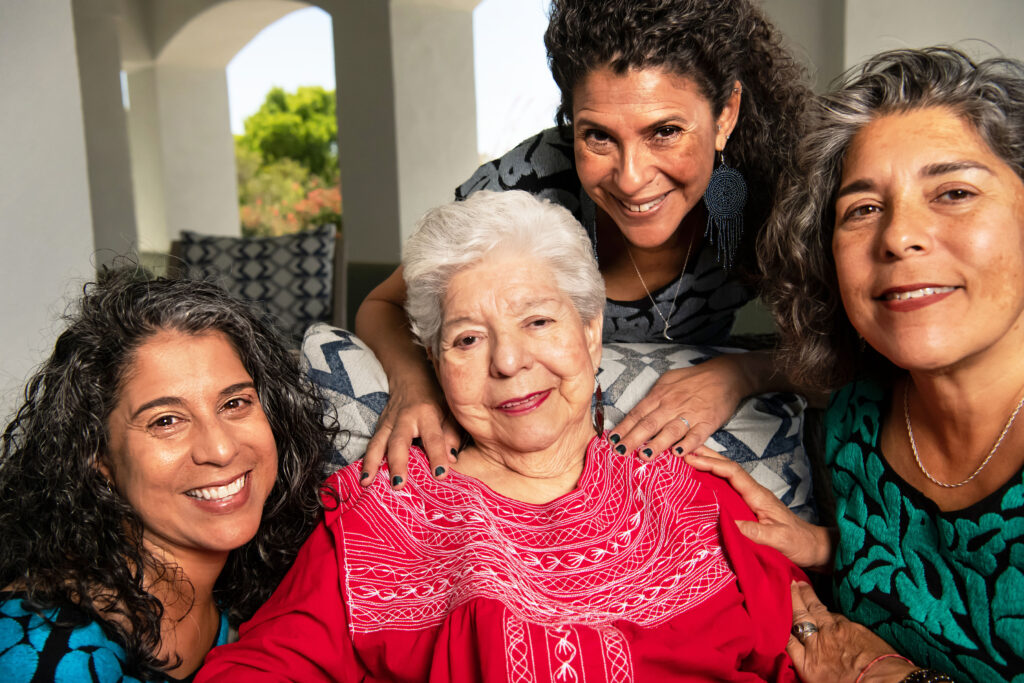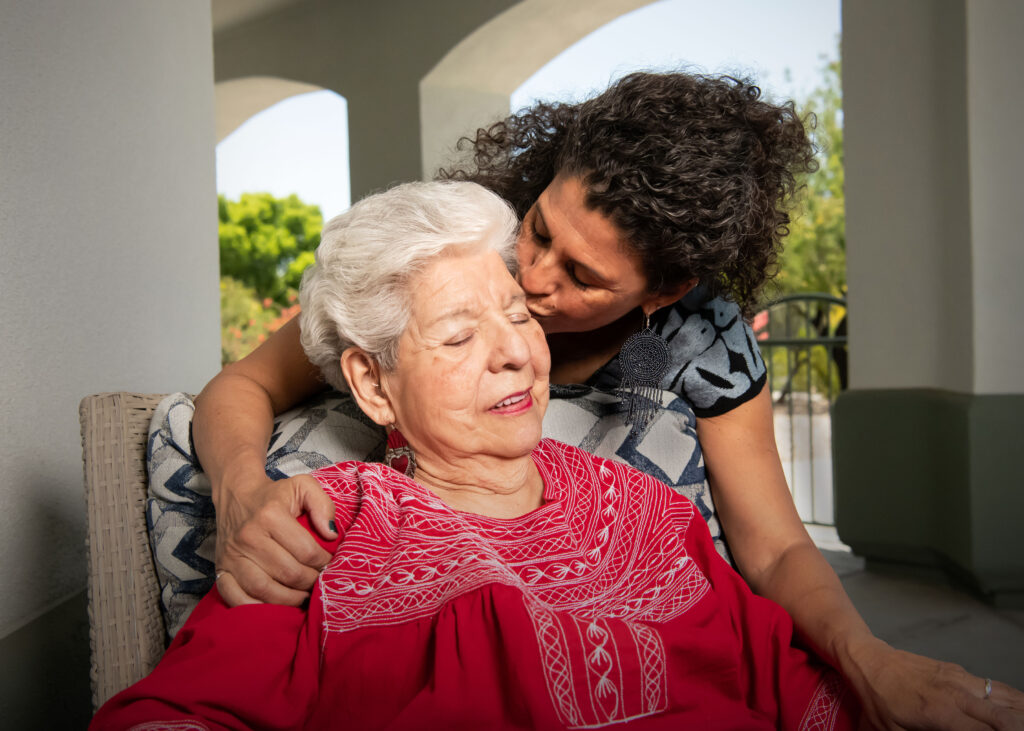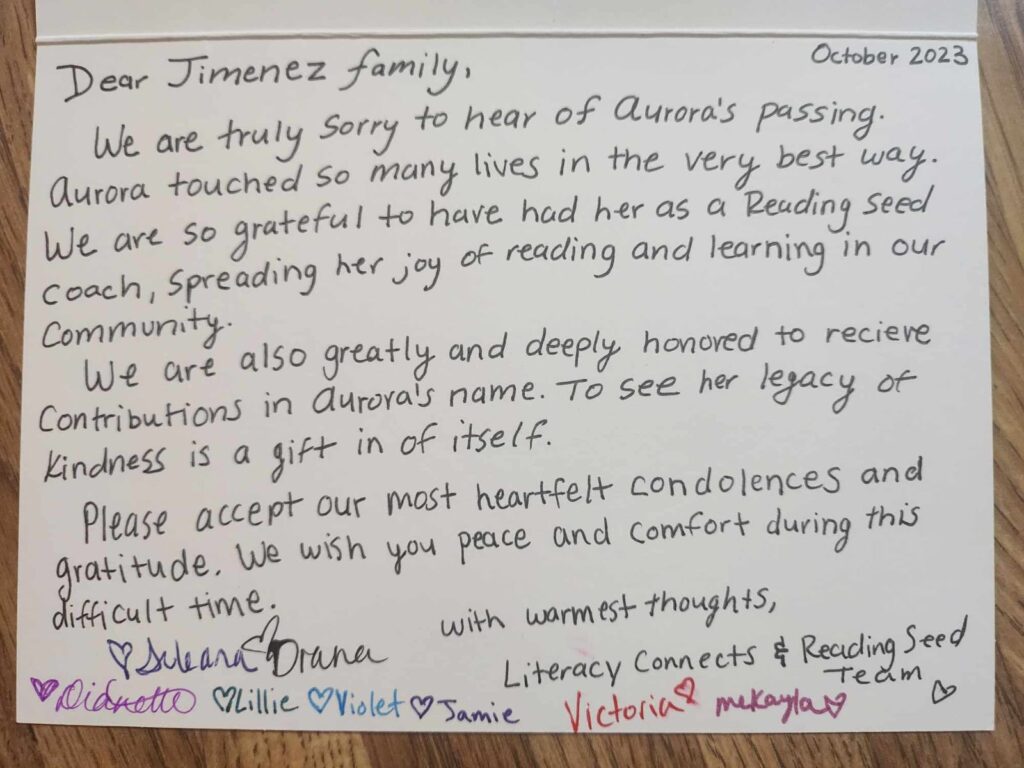You can read and share this eulogy as a PDF here.
My mother, Aurora Jimenez, died her second death on Sunday September 3. Her first death happened when she was born.
My Mom came into the world violently and not on her terms. The doctor used forceps to rip her out of her mother’s womb. She wasn’t breathing and the doctor told my abuelita her daughter was dead. It was only when the tiny body moved beneath the white sheet that the nurse realized my mom was alive. This was the first time
Aurora beat the odds.
By the time my mom was born, her mother, Rita de Luna, had already lost many children. Some in Mexico before she ever came to the US, some once she moved to Detroit. Seven in all. My Mom would tell us how her own mother never hugged her, wasn’t able to tell her that she loved her, until after my Mom had her own children, until she was almost 30 years old. It’s possible that when the doctor told my abuelita that her daughter was dead, she closed her heart to more heartbreak. Or maybe it was because my Mom was a girl, her only daughter, and not preferred like a son would have been? I can only guess now at what happened in my abuelita’s life, to my abuelita herself, to not be able to fully welcome this precious new life. My Mom, though, wanted something different for her own daughters. She made sure we would never doubt how loved we were. She showered us with affection, told us multiple times a day how much she loved us, ended every card and call with “I love you, m’ija.”
Yep, Aurora beat the odds.
This is even more remarkable if you knew, as we did, that Aurora never wanted to be a mother. I loved how honest she was with me and my sisters about that. She had to pretend she wanted to become a mom when she got married. She felt she couldn’t answer truthfully when people asked her about having children. She never used the word “sexism”, but she knew it wouldn’t be acceptable for her to say she didn’t want to have children. It was expected of her–by my dad, her family, her community, and all of society at that time.
Once she became a mom, though, something shifted for her. Having the three of us, she would tell us and anyone who would listen, was the best thing she did with her life. Anyone who spent more than 5 minutes with her knew how proud she was of her three daughters. Her girls. My mom was aware of the impacts of discrimination we would face as Latina females and she was determined to raise us to flourish, in spite of yet while still being aware of it. She knew what we’d be up against, and she would tell us what to expect. I will be forever grateful to her for this. She sacrificed to prepare us, as best she could, to have good lives. She wanted her daughters to have choices about how our lives would go, choices that she didn’t have. She wanted her daughters’ dreams to be taken seriously and backed to achieve them. She wholeheartedly believed that education, specifically college education, would give us that chance. She would boast that being college educated was a non-negotiable for her daughters. She was mocked for it (why educate them when they will “just get married, have kids, and stay at home”) and told it was a waste of money. Even my dedicated stay-at-home Dad who was completely committed to and loved being a chanclatero drew the line at anything that would mean his daughters leaving home, which both Rita and I did, to go to college. It was a source of tension and many disagreements between the two of them. And my mom would not back down.
Because of her, all three of us not only completed our undergraduate degrees, two of us completed our master’s and I was the first in our family to pursue a Ph.D. My Mom had wanted to go to college, but when she asked her own parents, they said there wasn’t money for that, there wasn’t money for that for a girl. Years later, when she retired, she went to college. She took classes toward an associate degree, including math, her most dreaded subject. And who taught her math class? Her youngest daughter, Ana.
Yes, Aurora beat the odds.

Books were young Aurora’s refuge. In her working-class family there was always work to be done, especially for the females. My abuelita’s side hustle was making and selling tortillas and tamales at the bars, to the neighbors, and in my abuelito’s store, Manuel & Sons. My mom spent countless hours alone in the basement cleaning the corn husks. She swore she’d never make another tamal once she left home. And she never did! My mom was trained to serve her father and her brothers. If she was caught sitting down, she would get scolded. Into her adult years, that pattern ran through her life, except, that is, when she was reading.
As a girl, she’d use a flashlight under her bed covers, hoping to not get caught with the latest page turner. Libraries were her version of heaven. She spent so many hours at the local library, the librarian asked her if she’d like a job shelving books. What could be better?! Books, reading, and literacy opened worlds to her she’d never have known otherwise. If she had been supported to go to college, she would have been a librarian, like her oldest daughter, Rita. Even without the degree, Aurora was determined to promote literacy. In her young adult years in Detroit, she would volunteer as a reading tutor at an elementary school before going into the office for a full day’s work. In her retirement, she worked with kindergarteners through Reading Seed to encourage a love of books and reading.
She devoured books, joined book clubs, befriended librarians, and visited the library as often as she could—and when she could no longer go to the library, she took full advantage of the Bookmobile that came to her. When her eyes could no longer read the small print, she was limited to large print, but that didn’t slow her down. It was not uncommon for her to be reading 4 or 5 books at a time. She read so many books, she lost track of which books she had already read! In 1998 she started to keep track. In the hall after Mass, you can see a print out of the alphabetized list of book titles she read up through 2017.
Aurora beat the odds.
That early forceps encounter left my mom permanently disabled. The nerves in her left arm were severed. That arm was shorter, and she couldn’t lift it halfway. My abuelita bought a piano for my mom as physical therapy. Aurora came to love the instrument. There was always a piano in our home. Keeping her hand nimble, my mom became a fast typist, learned, and took rapid shorthand (if that reference is before your time, Google it), and in the end, it’s what allowed her to get work when my Dad could no longer work outside the home.
Aurora beat the odds.
Around 7 years of age Aurora spent a year in bed with what they thought was polio. As female and working class she had internalized her body was a tool to serve, to be used for work, to earn money. Not too long after we moved to our home on Homestead in Tucson, my Dad invited my mom to go on walks with him. Before my dad, she had never been encouraged to be active for her health. Little by little, her endurance improved. I remember her excitement when she was able to walk to the end of our block and back home without stopping, just under a mile. She became an avid outside walker until, in 1993, a truck jumped the sidewalk and hit her full force. After a grueling surgery that the doctors weren’t sure she would survive (clearly, they had not met her) and rehabilitation, she not only walked again she completed her first 5K at 73 years of age.
On her 65th birthday, my sisters and I bought her a personal training package. Although she didn’t reveal it at the time, she later told us when she opened the card, she thought it the worst birthday gift we’d ever given her. Later, though, she thanked us. My Dad and her visited Desert Fitness daily. Even when she was in pain, she knew she needed to move, she wanted to move. Her determination inspired me and others. At her exercise classes she would help others who were more disabled than she was. She wanted others to be supported and encouraged to move as well.
Yep, Aurora beat the odds and helped others to beat them too.
Earning $18,000 annually as a bilingual telephone company Customer Service Representative, my Mom paid the parental contribution of $6,000 a year at Yale for me and $4,000 a year at Bryn Mawr for Rita, even during the two overlapping years when Rita and I were enrolled simultaneously. When there was a strike at the phone company, my Mom crossed the picket line to make sure she could keep up with the tuition payments. She didn’t want us to not finish our education. She didn’t want us to take a year off because of money. It broke her heart and her integrity to do it. She believed in and benefited from the Union. She lost friendships over this.
At a time when a woman’s income was not eligible to qualify for a bank mortgage, and my Dad was not able to work, my Mom figured out how to buy our two childhood homes in Detroit and Tucson. My Mom and Dad were poorly counseled on an investment of their life savings. They lost it all. My Dad wanted to let it go. My Mom didn’t. She felt they had been wronged and she wanted justice. She decided she would sue. She was scared and brave in the face of a complex legal system and a big corporation. And she won. After that, she learned even more about investing. She overcame her experience with poor advising to trust a new financial advisor, Rick, who is here with us today. She was able to pay for cash for the last home she and my Dad lived in on Lee Street, just a few blocks from here.

Aurora beat the odds.
My Mom’s love story with my Dad began with her crush on his brother. She was supposed to go on a date with him but when he couldn’t make it, my Dad, Miguel, jumped at the chance to go out with my Mom. Miguel had met her at the same party and was already smitten. When my Grandparents learned my Mom was dating a Puerto Rican, they forbade it. They carried prejudice against Puerto Ricans who were portrayed in the media as terrorists because they dared to stand up against the imperial power of the US, because they dared to fight for independence. My Mom would sneak out to meet my Dad–telling her parents she was going to work or leaving the house with curlers in her hair. (She wouldn’t possibly think of going to see her novio looking like that, would she?) Tired of sneaking and lying, she asked the priest to help her talk with her parents. She wanted their blessing. In front of the priest, my Grandparents agreed she could date my dad. When my Dad came to the house later that week to pick up my Mom, though, he was greeted with a pot of coffee thrown at his face.
Four years later, when my parents decided to marry, my abuelita wouldn’t allow anyone from the family to attend the wedding. Nevertheless, my Mom’s younger brother, Junior, stole away to be there for his sister and her oldest brother Lupe also showed up. He even offered to give her hand away. And Aurora never forgot that. She refused Lupe’s offer to walk her down the aisle, saying, “If my Dad won’t walk me, I’ll walk alone.” She often described it as the longest walk of her life. The priest who had counseled them before the wedding, predicted their marriage wouldn’t last 2 years. My mom would finish that story with a twinkle in her eye and a knowing grin, reporting, “That priest left the priesthood a couple years later. We outlasted him.”
Together they beat the odds.
Her dream was to have a Hawaiian honeymoon. The young couple didn’t have money for any kind of honeymoon, let alone one in Hawai’i. Still in her wedding dress, on that snowy and icy Detroit February day, they bussed to visit the sick mother of a friend. No, there was no honeymoon as they returned by bus, quite wet, cold, and tired to their tiny apartment at the end of that day. But if you knew my mother, you also know she’s not one to give up. Yes, it took her 50 years, but she finally got that honeymoon in Hawai’i, and by cruise no less.
Aurora beat the odds.
Don’t get me wrong, my parents’ marriage wasn’t a fairy tale. There were many times my sisters and I wondered why they didn’t get a divorce. The pressures of health and financial challenges took their toll. Since they couldn’t afford a sitter, our childcare was playing quietly in the waiting room during their marriage counseling appointments. (Little did I realize at the time how revolutionary seeking marriage counseling was for that era and as a couple from their backgrounds.) Still, I learned so much about what it means and takes to stay in a relationship through struggle from watching them not give up.
Aurora beat the odds.
When my Dad became a Jehovah’s Witness, I would joke that the Holy Wars had broken out in our home. It was painful to see how religion might tear them apart. Eventually, they reached a truce that blossomed into a true understanding. They agreed they would respect each other’s faith. My Mom used this moment to recommit to her Catholicism. She became a Eucharistic Minister and volunteered to lead a small faith community of women in Bible study. The purpose of this Jubilee initiative of the Pope’s was to make large congregations more personal. Of all the groups that started at St. Pius X, after about a year, my Mom’s was the only one still going. And the group stayed strong for over a decade. When declining health made monthly meetings a hardship for the members, my Mom proposed meeting for lunch to celebrate birthdays. Over time, they met to attend each other’s funerals. The two of the three final members who still live in Tucson, Jeanette and Patsy, are here today. Thank you.
They say people die as they lived. When my Mom went into hospice, those words returned to me and I was afraid when I thought about the journey ahead. I had heard stories from friends about how dementia had left their loved ones combative, suspicious, and angry. Dementia wasn’t like that for my Mom. With dementia, she forgot she was in pain. With dementia, she forgot to be afraid. With dementia, she forgot to be disappointed. With dementia, she forgot that she felt unlovable. My Mom died closer to her full self as I had ever witnessed. She took joy in watching the birds feed outside her window. She rested and let herself be tired. She touched deep gratitude and often expressed how blessed she was. She seemed genuinely content.
Mom died her second death on Sunday, September 3. And while she didn’t come into the world on her terms, she was in charge of how she left it. Her second death was as peaceful as her first death was violent. And when the funeral home transport placed the white sheet over her now cold body for the second time, she was surrounded in love by a family she had nurtured.
Aurora Jimenez beat the odds.
No, actually, she slayed them.

If you are so moved to, please donate to your local library or Reading Seed in Aurora’s name.
